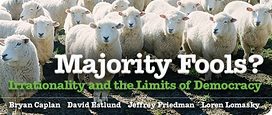Jeff writes:
But while that may be an argument—in my mind, at least—for making me king, it’s hardly an argument for giving more votes to people with bachelor’s degrees, or to councils of economics Ph.D.s. It so happens that at this particular point in history, American economists agree with me (and Caplan) on a few basic issues, such as free trade. But from the 1930s through the 1970s, economics was, from a free-market perspective, a disaster area, as it is in many other countries right now. So the temporary agreement of Caplan’s moderately Democratic colleagues with more pro-market views than are held by the general public doesn’t mean that we should institutionalize the rule of economist-kings, or the rule of the more educated slice of the public that (presumably through having majored in business or economics) seems to have picked up unusually pro-market views.
I agree that economists were less pro-market from the 30s to the 70s than they are today. Almost everyone was less pro-market back then. While we don’t have good data, I see no reason to doubt that economists and the well-educated were – compared to the general population – relatively more pro-market throughout the 20th century. In a similar vein, economists in the U.S. are more pro-market than economists in most other countries. Nevertheless, economists around the world usually seem quite pro-market relative to public opinion in their home countries.
So what do I have to do to convince you, Jeff? Would you be satisfied if my data spanned the century and the world? Or would that still be too “temporary” for you?

